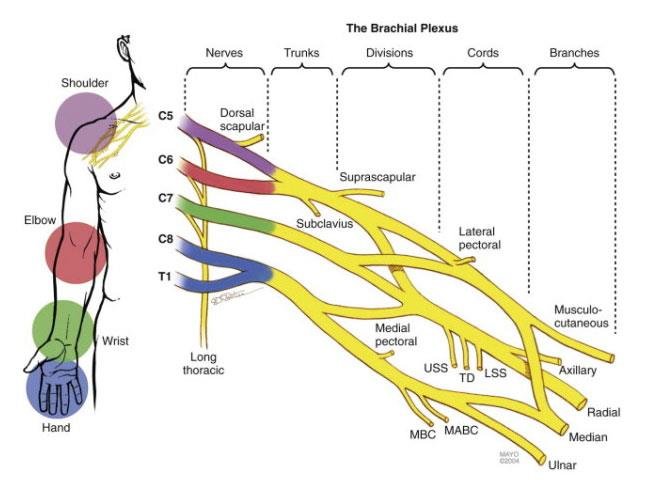BRACHIAL PLEXUS INJURY
The brachial plexus is a network of nerves that originate near the neck and shoulder. The nerves begin at the spinal cord in the neck area and control the shoulder, elbow, wrist, and hand. When the brachial plexus is injured certain symptoms will arise depending on where in the network of nerves the injury has occurred. These nerves are in a fragile area and can be damaged by pressure, stretching, or cutting. An example of a stretching injury occurs if one were to fall from a tree and grasp a branch on the way down. The force of stretch between the arm and the body can cause the nerves at the lower end of the network to become damaged. Injuries may range from minor, where recovery will occur completely, to severe, where permanent disability can be expected. Treatment goals are to restore nerve function.
The brachial plexus is a network of nerves that originate near the neck and shoulder. The nerves begin at the spinal cord in the neck area and control the shoulder, elbow, wrist, and hand. When the brachial plexus is injured, certain symptoms will arise depending on where in the network of nerves the injury has occurred. These nerves are in a fragile area and can be damaged by pressure, stretching, or cutting. An example of a stretching injury occurs if one were to fall from a tree and grasp a branch on the way down. The force of stretch between the arm and the body can cause the nerves at the lower end of the network to become damaged. Injuries may range from minor, where recovery will occur completely, to severe, where permanent disability can be expected.
Stretching of the nerves is the mildest injury, while more severe injuries can cause the nerves to rupture or avulse. A rupture involves the nerve tearing, either partially or completely. If a nerve avulses, the nerve root has been torn form the spinal cord, which may not be repairable.
Common symptoms include numbness or weakness, loss of sensation and movement, and pain. Treatment goals include restoring nerve function. Many mild brachial plexus injuries will recover spontaneously without surgical treatment. Nerve injuries that heal on their own tend to have better functional outcomes, so your doctor may delay surgery to monitor the injury. If the nerves fail to heal on their own or are severely damaged, surgery may be required to restore function. However, even surgery may not fully restore complete function to the hand and arm.

